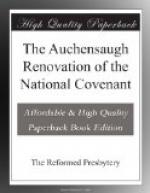5th, You must be careful that you do not forget the covenant; forgetting (as you heard before) is a step towards forsaking, and, therefore, you must endeavour to have the covenant nearer to you than the Israelites had it—they had it written upon the posts of their doors, you must have it written upon the tables of your hearts.
6th, You must evidence a great deal of cheerfulness and patience under your crosses, which may occur to you for your adherence to this your covenant; you must neither weaken your own hands in the discharge of covenanted duties, by drooping and discouragement under these crosses, nor stumble others, by repining at these losses, or by any carriage and deportment under them that may import your repenting of what you have now done. And because you are impotent and weak in yourselves, therefore,
7th, You must see that faith be in exercise in all your performances of covenanted duties. If this be wanting you will perform nothing to purpose, “for without faith it is impossible to please God.” By this grace you must keep up acquaintance with Christ, and have frequent recourse to him, both for cleansing you from your defilements, when you break the covenant, and for strength to perform what you are obliged to by covenant; both for recovering grace, to raise you up when fallen, and for preventing grace, to preserve you from falling or relapsing again.
8th, That you may be the more active and vigilant in keeping covenant, you must labor to maintain a constant fear of breaking it, and have a fixed impression of the tremendous threatening denounced against covenant-breakers; and you must know that all are such in God’s account, who satisfy themselves with the form of godliness, denying the power thereof. For this end read and ponder these and the like scriptures.
Lev. xxvi. 25, “And I will bring a sword upon you, that shall avenge the quarrel of my covenant, and when ye are gathered together within your cities, I will send the pestilence among you: and ye shall be delivered into the hand of the enemy.” Neh. v. 13—“So God shall shake out every man from his house, and from his labor, that performeth not this promise; even thus be he shaken out and emptied.” Jer. xi. 3, “Cursed be the man that obeyeth not the words of this covenant, which I commanded your fathers in the day that I brought them forth from the iron furnace.” Ezek. xvii. 15, “Shall he prosper? shall he escape that doth such things? or shall he break the covenant and be delivered?” Verse 18, “Seeing he hath despised the oath, by breaking the covenant, when lo, he had given his hand, and hath done all these things, he shall not escape.” Verse 19th, “Therefore, thus saith the Lord God, as I live, surely mine oath that he hath despised and my covenant that he hath broken, even it will I recompense upon his own head.”
The minister having given these exhortations, closed the day’s work with prayer, and singing a part of the ciii. Psalm from the 17th to the 19th verse. And having intimated the time of meeting for more immediate preparation for the holy communion, putting the people in mind to be preparing for the work, by fervent prayer and supplication, joined with serious and upright self-examination, he dismissed the congregation after the usual form.




